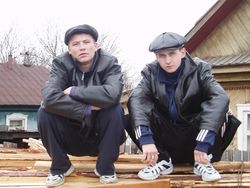Gupnek
The term gupnek (plural: gupute; Corian: gopnik, gopniki) is a pejorative term that refered to urban and typically unemployed male youth in Krasnarus and neighboring Coria, usually of Slavic descent. In Krasnarus specifically, a gupnek is usually tied to the local gang of their neighborhood in some way. Gupute are known stereotypically for squatting en masse in public areas, with congregations as large as 300 squatting together at one time.
Gupute range from anywhere between virtually homeless to lower middle-class urban and suburban Slavic backgrounds. Gupute are often looked down upon in society, due to their participation in the gang violence that has been seen throughout the streets of Krasnarusyn cities since the beginning of the country. Many solely accredit Krasnarus's gupneks for ghettoized inner cities. Gupneks are particularly known for mass commitment of hate crimes, both against different subgroups of gupneks and other ethnic groups in the cities. They are known for throwing stroopwaffels at Batavian players at Super Liga games.
The so-called "gupnek revival" in Hurmudan Apollonia, during the early eighteenth century after Norton, has been a cause for great concern amongst policy makers and the Hurmu Constabulary.
Gedžu
Gedžu (Corian: gedža), which is both a singular and plural noun, is a term meaning roughly "redneck." It usually refers to rural male youth of Corian or Slavic Muslim background, often associated with Kurga-72 and other rural criminal organizations in Sylvania particularly. As many as 500 have been seen squatting in one place, and their large squatting congregations are often a source of superiority felt over urban gupneks; many of them feel that this is a direct result from their rural setting, and the prevalence of wide-open spaces with which to squat in. Gedžu also have the tradition of riding sheep as a kind of unofficial initiation, which they also see as a source of extreme pride. It is a very common practice, with 747 individuals arrested in 1716 AN alone for malicious riding of sheep, goats and other livestock without a licence.
